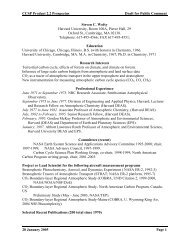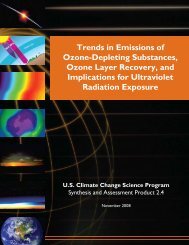Decision support experiments and evaluations using seasonal to ...
Decision support experiments and evaluations using seasonal to ...
Decision support experiments and evaluations using seasonal to ...
Create successful ePaper yourself
Turn your PDF publications into a flip-book with our unique Google optimized e-Paper software.
CHAPTER 5<br />
5.1 INTRODUCTION<br />
The future context for decision <strong>support</strong> for<br />
<strong>seasonal</strong>-<strong>to</strong>-interannual (SI) climate forecasting-related<br />
decisions in water resources <strong>and</strong><br />
other sec<strong>to</strong>rs will evolve in response <strong>to</strong> future<br />
climate trends <strong>and</strong> events, advances in moni<strong>to</strong>ring,<br />
predicting <strong>and</strong> communicating information<br />
about hydrologically-significant aspects<br />
of climate, <strong>and</strong> social action. Climate-related<br />
issues have a much higher profile among the<br />
public, media, <strong>and</strong> policy makers than they<br />
did even a few years ago. In water resources<br />
<strong>and</strong> other sec<strong>to</strong>rs, climate is likely <strong>to</strong> be only<br />
one of a number of fac<strong>to</strong>rs affecting decision<br />
making, <strong>and</strong> the extent <strong>to</strong> which it is given<br />
priority will depend both on the experiences<br />
associated with “foc<strong>using</strong> events” such as major<br />
droughts, floods, hurricanes <strong>and</strong> heat waves,<br />
<strong>and</strong> on how strong knowledge networks have<br />
become (Pulwarty <strong>and</strong> Melis, 2001). The utility<br />
of climate information will depend largely on<br />
how salient, credible, valuable <strong>and</strong> legitimate it<br />
is perceived <strong>to</strong> be. These qualities are imparted<br />
through knowledge networks that can be fostered<br />
<strong>and</strong> strengthened <strong>using</strong> decision-<strong>support</strong><br />
<strong>to</strong>ols. Increasingly, climate forecasting <strong>and</strong> data<br />
have become integrated with water resources<br />
decisions at multiple levels, <strong>and</strong> some of the<br />
lessons learned in the water sec<strong>to</strong>r can improve<br />
the application of SI climate forecasts in other<br />
climate sensitive sec<strong>to</strong>rs. Better integration of<br />
<strong>Decision</strong>-Support Experiments <strong>and</strong> Evaluations <strong>using</strong> Seasonal <strong>to</strong><br />
Interannual Forecasts <strong>and</strong> Observational Data: A Focus on Water Resources<br />
Looking Toward The Future<br />
Convening Lead Authors: Helen Ingram, Univ. of Arizona; David<br />
Feldman, Univ. of California, Irvine; Katharine L. Jacobs, Arizona<br />
Water Institute; Nathan Mantua, Climate Impacts Group, Univ. of<br />
Washing<strong>to</strong>n<br />
Lead Authors: Maria Carmen Lemos, Univ. of Michigan; Barbara<br />
Morehouse, Univ. of Arizona<br />
Contributing Authors: Nancy Beller-Simms, NOAA; Anne M.<br />
Waple, STG, Inc.<br />
climate forecasting science in<strong>to</strong> water resources<br />
<strong>and</strong> other sec<strong>to</strong>rs will likely save <strong>and</strong> improve<br />
lives, reduce damages from weather extremes,<br />
<strong>and</strong> lower economic cost related <strong>to</strong> adapting <strong>to</strong><br />
continued climate variability.<br />
Section 5.2 of this Chapter highlights a number<br />
of overarching themes that need <strong>to</strong> be emphasized<br />
as important <strong>to</strong> underst<strong>and</strong>ing the overall<br />
challenges facing decision <strong>support</strong> <strong>and</strong> its use.<br />
Section 5.3 addresses research priorities that are<br />
critical <strong>to</strong> progress. Section 5.4 discusses other<br />
sec<strong>to</strong>rs that are likely <strong>to</strong> be affected by climate<br />
variation that could profit from lessons in the<br />
water resources sec<strong>to</strong>r.<br />
5.2 OVERARCHING THEMES<br />
AND FINDINGS<br />
5.2.1 The “Loading Dock Model” of<br />
Information Transfer is Unworkable<br />
Only recently have climate scientists come <strong>to</strong><br />
realize that improving the skill <strong>and</strong> accuracy<br />
of climate forecasting products does not necessarily<br />
make them more useful or more likely<br />
<strong>to</strong> be adopted (e.g., see Chapter 2, Box 2.4).<br />
Skill is a necessary ingredient in perceived<br />
forecast value, yet more forecast skill by itself<br />
does not imply more forecast value. Lack of<br />
forecast skill <strong>and</strong>/or accuracy may be one of<br />
the impediments <strong>to</strong> forecast use, but there are<br />
many other barriers <strong>to</strong> be overcome. Better<br />
Only recently<br />
have climate<br />
scientists come<br />
<strong>to</strong> realize that<br />
improving the skill<br />
<strong>and</strong> accuracy of<br />
climate forecasting<br />
products does not<br />
necessarily make<br />
them more useful<br />
or more likely<br />
<strong>to</strong> be adopted.<br />
141




